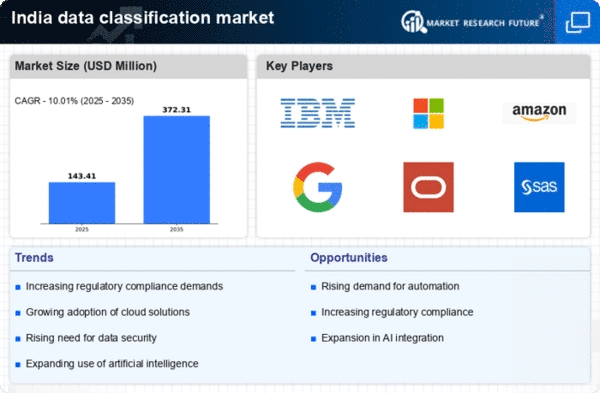Rising Data Privacy Concerns
The data classification market in India is experiencing a notable surge due to increasing concerns regarding data privacy. With the implementation of stringent data protection regulations, organizations are compelled to classify and manage sensitive information effectively. The demand for data classification solutions is projected to grow as businesses seek to comply with legal requirements and protect customer data. According to recent estimates, the market is expected to expand at a CAGR of approximately 20% over the next five years. This growth is driven by the need for organizations to mitigate risks associated with data breaches and enhance their overall data governance strategies. As a result, the data classification market is becoming a critical component of data management frameworks across various sectors in India.
Emergence of Advanced Analytics
The rise of advanced analytics in India is influencing the data classification market significantly. Organizations are increasingly leveraging analytics to derive actionable insights from their data. However, the effectiveness of these analytics is contingent upon the proper classification of data. As businesses strive to enhance their analytical capabilities, the demand for data classification solutions is likely to increase. It is estimated that the analytics market in India will reach $16 billion by 2025, which could further propel the data classification market as companies seek to ensure that their data is organized and accessible for analytical purposes. This trend suggests that the data classification market will play a crucial role in enabling organizations to harness the full potential of their data assets.
Escalating Volume of Data Generation
The exponential increase in data generation in India is significantly impacting the data classification market. With the rise of digital transformation initiatives, organizations are inundated with vast amounts of unstructured data. This phenomenon necessitates the implementation of effective data classification solutions to ensure that valuable insights can be extracted from this data deluge. It is estimated that the volume of data generated in India will reach 175 zettabytes by 2025, further emphasizing the need for robust classification systems. Companies are increasingly recognizing that without proper classification, the potential for data-driven decision-making is severely hampered. Consequently, the data classification market is poised for substantial growth as businesses invest in technologies that facilitate efficient data organization and retrieval.
Growing Adoption of Cloud Technologies
The shift towards cloud computing in India is a significant driver for the data classification market. As organizations migrate their operations to the cloud, the need for effective data classification becomes paramount. Cloud environments often host diverse data types, making it essential to classify data accurately to ensure compliance and security. The Indian cloud market is projected to reach $10 billion by 2025, indicating a robust demand for cloud-based data classification solutions. This trend is likely to encourage vendors to develop innovative classification tools tailored for cloud infrastructures. As businesses increasingly rely on cloud services, the data classification market is expected to witness accelerated growth, driven by the necessity for efficient data management in these environments.
Need for Enhanced Data Security Measures
The imperative for enhanced data security measures is a critical driver for the data classification market in India. With the increasing frequency of cyber threats and data breaches, organizations are prioritizing the protection of sensitive information. Effective data classification is essential for implementing robust security protocols, as it allows organizations to identify and safeguard critical data assets. The Indian cybersecurity market is projected to grow to $3.5 billion by 2025, highlighting the urgency for businesses to invest in data classification solutions that bolster their security frameworks. This growing emphasis on data security is likely to propel the data classification market, as organizations recognize the need for comprehensive strategies to protect their data from evolving threats.
















